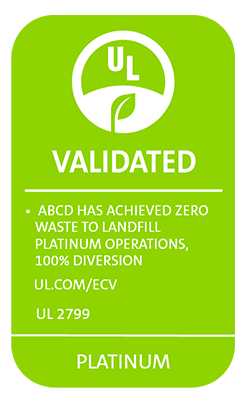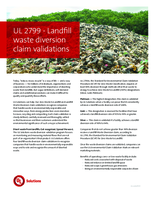
Today, “reduce, reuse, recycle” is a way of life — and a way of business — for millions of individuals, and organizations who understand the importance of diverting waste from landfills. But vague definitions, self-declared claims and undefined procedures can make it difficult to qualify and quantify these efforts. Businesses of all sizes are all working towards a unified goal: achieving zero waste.
Zero waste audit and validation program
Waste generation and waste mitigation have become key issues in the transition toward a circular economy. According to Statista, worldwide solid waste generation is expected to increase by nearly 70% to 3.4 billion metric tons by 2050 and with less than 20% of waste properly disposed of or recycled, the interest in zero waste strategies and validation continues to grow.
Businesses are looking to reduce their risk as it relates to waste. Sustainable waste management and validation have become crucial for businesses pursuing sustainability and their stakeholders because these practices directly benefit local economies, global society and the environment. Achieving zero waste is a crucial step toward sustainability.
Create a waste diversion plan
The UL Solutions waste diversion validation program focuses on monitoring and measuring material flows that are not part of an organization’s final product at facility level. We offer four landfill waste diversion claim validations to recognize businesses that handle waste in environmentally responsible and innovative ways:
- Energy production via incineration
- Reuse
- Recycling
- Composting
Materials that are not diverted are considered disposed of and go to the landfill or incineration without energy recovery.
UL Solutions can help. Our Zero Waste to Landfill and Landfill Waste Diversion claim validations recognize companies that handle waste in environmentally responsible and innovative ways, from energy production via incineration to reuse, recycling and composting. Each claim validation is clearly defined, carefully reviewed and thoroughly vetted so that businesses and their customers understand the environmental significance of such a major achievement. Watch our video to learn more.
Benefits of environmentally responsible waste management
Benefits of operating a zero- or low-waste facility include:
- Reduced costs associated with the disposal of waste.
- Reduced reliance on limited landfill space.
- Reduced Scope 3 Greenhouse Gas Emissions.
- Being an environmentally responsible corporate citizen.
Zero Waste to Landfill Environmental Claim Validation
UL 2799, the Standard for Environmental Claim Validation Procedure (ECVP) for Zero Waste to Landfill requires each facility of an organization to prove at least 90% diversion through methods other than waste to energy for that facility to achieve Zero Waste to Landfill (ZWTL) designations (Silver, Gold, Platinum).

-
Platinum — The highest designation; this claim is validated by UL Solutions when a facility can prove that it consistently achieves a landfill waste diversion rate of 100%.
-
Gold — This designation is reserved for facilities that have achieved a landfill diversion rate of 95% to 99% or greater.
-
Silver — This claim is validated if a facility achieves a landfill diversion rate of 90% to 94%.
Facilities that achieve diversion rate less than 90% and above 80% can still qualify for a certified landfill diversion claim.
Each environmental claim validation is clearly defined, carefully reviewed and thoroughly evaluated so that organizations and the public can understand the environmental significance of such a major achievement.
UL Solutions also offers supportive services to help companies implement and promote their waste reduction claims. We conduct readiness assessments, develop programs to optimize processes for waste reduction, reuse and recycling; and validate claims for recyclability, recycled content and take-back programs for waste or reclaimed materials.
Related standard

Landfill Waste Diversion Claim Validation
Get connected with our sales team
Thanks for your interest in our products and services. Let's collect some information so we can connect you with the right person.
Related resources
- UL 2799 Environmental Claim Validation Procedure
- UL SPOT Product Database
- Pursuing Zero Waste to Landfill for Manufacturing
- What is ZWTL and Why Does It Matter?
- How to Achieve and Validate Zero Waste to Landfill
- ABB Electrification in Frosinone, Italy Achieves Zero Waste
- Working Together in Promoting Sustainability
- Pursuing Zero Waste to Landfill for Manufacturing
- The Quest for Zero Waste to Landfill with UL 2799




